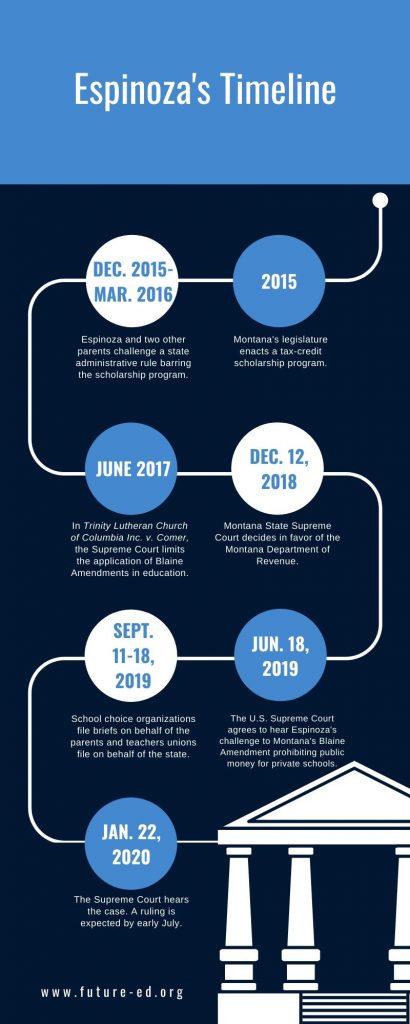Espinoza v. Montana Department of Revenue: How Wednesday’s Supreme Court Arguments Could Shift the Country’s School Choice Debate to Private Schools

While the Democratic presidential candidates have been criticizing the expansion of charter schools in public education, the U.S. Supreme Court is about to hear oral arguments in a case with the potential to greatly expand taxpayer support of private schools.
Some 500,000 students attend private schools under publicly funded tuition vouchers or tax-credit scholarships that provide full or partial state tax credits for those who donate to organizations that provide private school scholarships.
Montana lawmakers in 2015 passed legislation making Montana one of 18 states to permit such tax credits. The following year, the state’s executive branch issued an administrative rule barring tax-credit scholarships from being used at religiously affiliated schools, citing the Montana constitution’s Blaine Amendment’s prohibition of public dollars from directly or indirectly financing such organizations.
The Supreme Court is hearing a challenge to the state’s action Wednesday in Espinoza v. Montana Department of Revenue.
Montana is one of 37 states with Blaine amendments in their constitutions, named for Congressman James G. Blaine, who in 1875 proposed an unsuccessful amendment to the Constitution prohibiting the use of public funds to support sectarian schools. The Supreme Court ruled in Trinity Lutheran Church of Columbia Inc. v. Comer in 2017 that Missouri’s Department of Natural Resources unconstitutionally denied playground materials to a religiously affiliated preschool. The narrow ruling struck down the power of Blaine amendments in certain education contexts — rather than striking them down entirely.
The question is whether the justices will go further in Espinoza.
The ruling could have a profound effect in Montana and beyond. Nearly 70 percent of Montana’s private schools are religiously affiliated. Kendra Espinoza used a tax-credit scholarship to enroll a child at Stillwater Christian School in Kalispell, Montana. She and the other parents sued the state in the wake of the administrative ruling. The state Supreme Court reversed a lower court ruling and agreed with the state’s Department of Revenue that the tax-credit scholarship program is unconstitutional.
Hoping for a broader win, school choice advocacy organizations such as the Alliance for Choice in Education and EdChoice are filing amici curiae — “friend of the court” — briefs in support of Espinoza and the other plaintiffs. Teacher advocacy organizations, such as the Tennessee Education Association, have filed briefs in support of the state.
Many legal scholars anticipate a ruling in favor of Espinoza and the Montana tax-credit program from the conservative court — a development that could shift the focus of the national school-choice debate to private schools.
This article also appeared at future-ed.org.
Get stories like these delivered straight to your inbox. Sign up for The 74 Newsletter

;)
